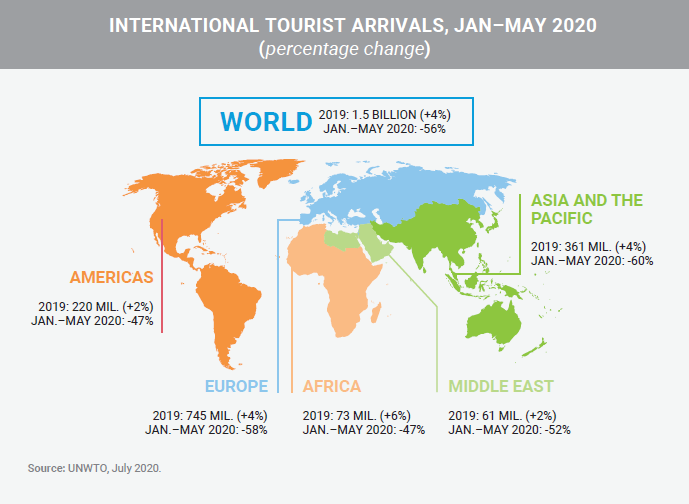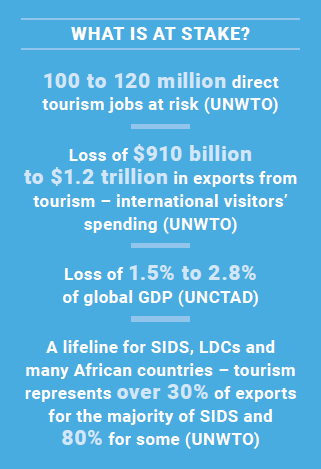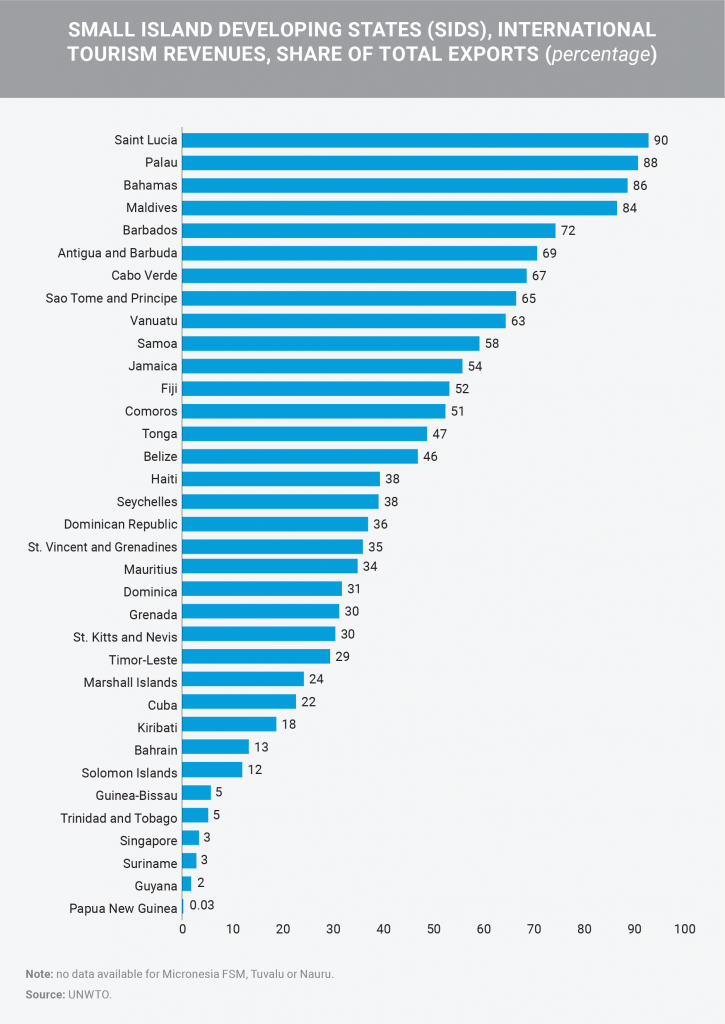Imagine a project so massive that it employed one-tenth of the world’s population. This monument to global cooperation would bring together almost every culture on the planet, driving not just social development but peace and prosperity among nations. And then imagine how devastating the impacts of the pandemic would be to it.
 This project is the global tourism sector. No wonder that when introducing the UN’s new Policy Brief on COVID-19 and Transforming Tourism, UN Secretary General António Guterres remarked that “one might say that tourism is itself one of the wonders of the world.” Less lustrous is the devastating impact of the virus on global tourism so far: in the first five months of 2020, international tourist arrivals decreased by more than half and some $320 billion dollars in exports from tourism were lost, putting some 120 million direct jobs in tourism and up to 2.8% of global GDP at risk. Women, rural communities, indigenous peoples, and young people are particularly vulnerable, as are small island developing States, some of which depend on tourism for up to 80% of their exports.
This project is the global tourism sector. No wonder that when introducing the UN’s new Policy Brief on COVID-19 and Transforming Tourism, UN Secretary General António Guterres remarked that “one might say that tourism is itself one of the wonders of the world.” Less lustrous is the devastating impact of the virus on global tourism so far: in the first five months of 2020, international tourist arrivals decreased by more than half and some $320 billion dollars in exports from tourism were lost, putting some 120 million direct jobs in tourism and up to 2.8% of global GDP at risk. Women, rural communities, indigenous peoples, and young people are particularly vulnerable, as are small island developing States, some of which depend on tourism for up to 80% of their exports.
Here, it is difficult to underestimate the importance of the symbiotic relationship between the global aviation and tourism sectors. Before the crisis, approximately 58 per cent of the 1.5 billion tourists who were crossing borders every year travelled by air, supporting close to 37 million jobs within the tourism sector. In sum, this equated to roughly $897 billion a year to global GDP. Now, ICAO estimates point to a potential loss of up to $387 billion in gross operating revenues of airlines in 2020, with around 90 per cent of the fleet being grounded and demand close to zero during the second quarter of 2020. Looking forward, the picture remains unclear, but the duration and magnitude of the outbreak and containment measures, levels of consumer confidence, and the broader economic conditions will remain determining factors.

This is why the UNWTO Global Tourism Crisis Committee and the ICAO Council Aviation Recovery Task Force (CART) have formulated sector-wide recovery responses. The UNWTO Committee, comprised representatives of Member States, the private sector, ICAO, and other international bodies, released its first set of global recommendations in March. Similarly, the CART brought States and key aviation bodies together to produce and implement guidelines that include a set of globally-harmonized and mutually-accepted risk mitigation measures related to aviation safety, aviation public health, facilitation and aviation security, as well as economic and financial measures. It is against this background, and with key contributions from UNWTO, ICAO, and others, that the UN’s policy brief was developed.
The policy brief provides immediate guidance to States to help protect, sustain, and revive tourism, notably through the provision of a roadmap comprised of five priorities. It also crucially underscores the pivotal importance of “building back better,” to ensure that tomorrow’s global tourism sector is more resilient, more sustainable, and contributes more fully to the achievement of Sustainable Development Goals and the objectives of the Paris Agreement on Climate Change.
“Enhancing sustainable regional tourism development provides considerable benefits from making tourism-dependent regions less vulnerable to economic threats, to using resources more sustainably, creating green jobs and enhancing transport connectivity… Action on climate change and investments in low-carbon infrastructure and R&D can generate broad-based economic growth and create millions of new jobs – renewable energies alone could create 42 million jobs by 2050,” note the authors.

On this topic, the policy brief provides important momentum towards the aviation sector’s own sustainability initiatives. “Financial and bailout support from governments for the accommodation, cruise and aviation industries could ensure unsustainable polluting practices are banned, prevent backtracking on past achievements, and incentivize a restart of those industries in alignment with the goals of the Paris Agreement. In the aviation sector specifically, the crisis must not become a pretext to back away from its decarbonization goals of 2 per cent annual fuel efficiency improvement through 2050 and carbon-neutral growth from 2020 onwards,” write the authors, nothing that “conditionalities associated with financial and bailout support could, for instance, come in the form of investment into sustainable aviation fuels, setting science-based targets for flights regarding waste reduction, including food waste and single-use plastic, and reducing meat-based products on board.”
Pointing to the policy brief at the ICAO Stocktaking Seminar on aviation in-sector CO₂ emissions reductions, ICAO Secretary General Fang Liu noted: “how global connectivity shares such a complex and symbiotic relationship with our goals of preserving the natural environment, and how fragile communities and ecosystems can also be placed at heightened risk by reductions in international travel and tourism.”
This illustrates how our challenges in aviation environmental protection today refer not only to aircraft emissions, and why innovation and imagination will be just as important to the global solutions we seek as new rules or restrictions,” she declared in her opening remarks.
Speaking at a recent aviation forum, ICAO Council President Salvatore Sciacchitano also stressed the importance of carrying forward these commitments. “In the first place, we have a duty to keep current passengers and crew protected from COVID-19 health risks through every stage of the air travel experience. Secondly, we need to keep commercial civil aviation viable from the most basic of economic standpoints. Thirdly, we must ensure that it restarts and recovers with due consideration of all associated safety, security, and other traditional aviation performance metrics. And lastly, we need to rebuild it on a solid foundation of sustainability – both in terms of the network’s ability to better withstand future pandemics, and its overall role in the social and environmental impacts of travel and tourism,” he said.
He emphasized that despite the incredible challenges to the fundamentals of their businesses and operations, most of the onus will fall to air transport operators, manufacturers and others. For this reason, he underscored that it “is of the utmost importance that all aviation stakeholders continue to show solidarity with one another, and to work as ‘one aviation team’ toward our shared goal of safely and sustainably reconnecting the world.”
Similarly, the policy brief concludes in noting that “Only through collective action and international cooperation will we be able to transform tourism, advance its contribution to the 2030 Agenda and its shift towards an inclusive and carbon-neutral sector that harnesses innovation and digitalization, embraces local values and communities and creates decent job opportunities for all, leaving no one behind.”
About the author
William Raillant-Clark is ICAO’s Communications Officer. Prior to launching his career with the United Nations five years ago, he was an institutional science writer and advocate for major Canadian universities, with a focus on human wellbeing and development.

